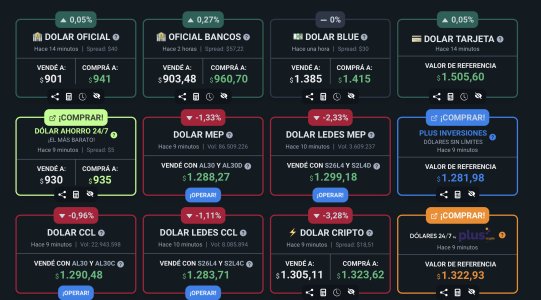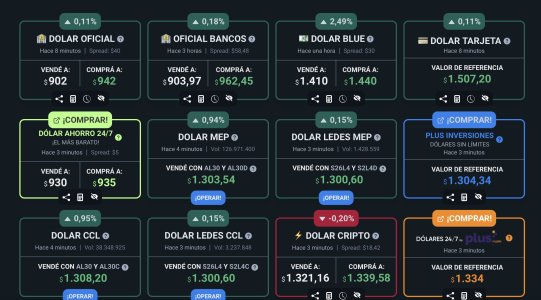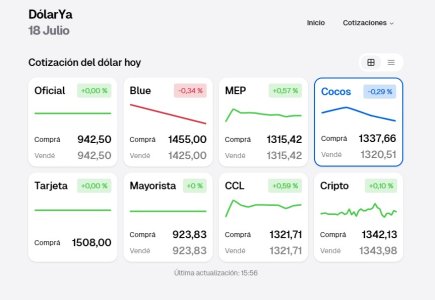Navigation
Install the app
How to install the app on iOS
Follow along with the video below to see how to install our site as a web app on your home screen.
Note: This feature may not be available in some browsers.
More options
You are using an out of date browser. It may not display this or other websites correctly.
You should upgrade or use an alternative browser.
You should upgrade or use an alternative browser.
Blue dollar hits a new historical record! 1,500 to $1 USD
- Thread starter Betsy Ross
- Start date
This is true. No one knows what will happen in the long term. Short term blue and MEP should go down but let's see what happens with all this intervention.In other words, none of you know what will happen. I see the Blue dollar holding steady today but the MEP continues to go down.
View attachment 6690
Betsy Ross
Well-known member
Great post Tony. I think your comparison is a good one. Let's see how the long term effect is on this.I would compare this to a company doing a stock buyback program using profits / cash flow generated from operations. That would be different from doing a stock buyback by issuing more debt which is more like what the previous administration did.
One thing to keep in mind about a stock buyback program is that timing and frequency of the purchases are not set in stone. Whether the program is effective in the long term depends on the fundamentals of the company. In this case, if Argentina is not issuing new debts to support this program, but only using a portion of their surpluses then I think it's a wise use of those funds.
Keep in mind that their actions have the effect of helping to keep inflation under control, which is important for the people most hurt by the recession and government spending cuts. So in effect, they are using the savings from reduced subsidies to help the poor. This is similar to how the local governments have a big increase in tax revenue collection from higher utility bills, and then part of those funds are then used to help those locals who need the help the most. So in effect, part of the subsidies still exist except it's moved from the federal level to the local level, and the subsidies are more targeted to those who really need it.
Limited and strategic intervention using budget surpluses should not be confused with previous administrations that kept borrowing / printing more money to basically bribe the voters in an unsustainable way.
As signs of Argentina start growing again this quarter, and especially next quarter, the level of intervention would be greatly reduced and perhaps no longer even necessary.
The truth is that nothing the administration have done so is new. It might be new to Argentina, but not new in this world. The consequences of their policies are also not new, therefore their mitigation plans are also not new. Of course the same plans don't always work due to various reasons, but there are also existing plans to deal with different outcomes. However, I think there are still plenty of reasons to be hopeful that this administration is on the right track.
Cardiac Arrest
Active member
Digital Nomad
Well-known member
There should probably be a lot of volatility while they figure things out. I know Milei and Caputo say they aren't worried. But when they have to say that it means they are worried. I guess if they can't stop the spread then they would have to devalue the official rate again? Which probably means inflation will go back up.
It sounds like the Central Bank didn't even do anything yesterday at all like they said they would do.

 www.lanacion.com.ar
www.lanacion.com.ar
It sounds like the Central Bank didn't even do anything yesterday at all like they said they would do.

Dólar hoy: rebotaron el blue y los financieros, y volvieron a caer bonos y acciones
Tras las fuertes bajas, el tipo de cambio paralelo avanzó $50 y se vendió a $1455, mientras que el MEP y el contado con liqui superaron la barrera de los $1300; los papeles argentinos, en rojo
Betsy Ross
Well-known member
Sometimes the government wants people to be scared and that sounds like yesterday that is what they are doing. I agree with others that say you shouldn't fight the government if they are determined to do something. It might work in the short term but I've been in Argentina for a while and over the long term it's always been beneficial to hold US dollars and not pesos. So far nothing they have said would show me that that has changed. Quite the opposite, all this intervention gives me even less hope the peso will turn around.There should probably be a lot of volatility while they figure things out. I know Milei and Caputo say they aren't worried. But when they have to say that it means they are worried. I guess if they can't stop the spread then they would have to devalue the official rate again? Which probably means inflation will go back up.
It sounds like the Central Bank didn't even do anything yesterday at all like they said they would do.

Dólar hoy: rebotaron el blue y los financieros, y volvieron a caer bonos y acciones
Tras las fuertes bajas, el tipo de cambio paralelo avanzó $50 y se vendió a $1455, mientras que el MEP y el contado con liqui superaron la barrera de los $1300; los papeles argentinos, en rojowww.lanacion.com.ar
A great relief to just hold US Dollar savings/income and exchange pesos as needed. It looks like it will head back up to 1500 to $1 quickly. I may exchange another months worth of expenses for August then but not buying more pesos than what I need.
Vince
Well-known member
That's correct Betsy. Already in some provinces today it hit 1,490. A friend told me it's higher outside of CABA. The measures Caputo are trying to do reek of desperation. It just hit 1,465.Sometimes the government wants people to be scared and that sounds like yesterday that is what they are doing. I agree with others that say you shouldn't fight the government if they are determined to do something. It might work in the short term but I've been in Argentina for a while and over the long term it's always been beneficial to hold US dollars and not pesos. So far nothing they have said would show me that that has changed. Quite the opposite, all this intervention gives me even less hope the peso will turn around.
A great relief to just hold US Dollar savings/income and exchange pesos as needed. It looks like it will head back up to 1500 to $1 quickly. I may exchange another months worth of expenses for August then but not buying more pesos than what I need.
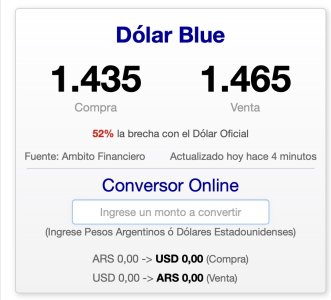
Spend Thrift
Well-known member
Whack a mole is correct! Read this article today. It sounds like this ain't going to be easy.Correct. Might be a solution for the gap but country risk has now gone up. Real life game of Whack a Mole.
Tras los anuncios de Caputo, bajaron los dólares financieros, pero subió el riesgo país y cayeron los bonos | TN
El mercado reaccionó este lunes a las medidas del Gobierno sobre la nueva política monetaria. El CCL y el MEP se ubicaron cerca de los $1300; mientras que el blue retrocedió $85 y cerró a $1415.tn.com.ar
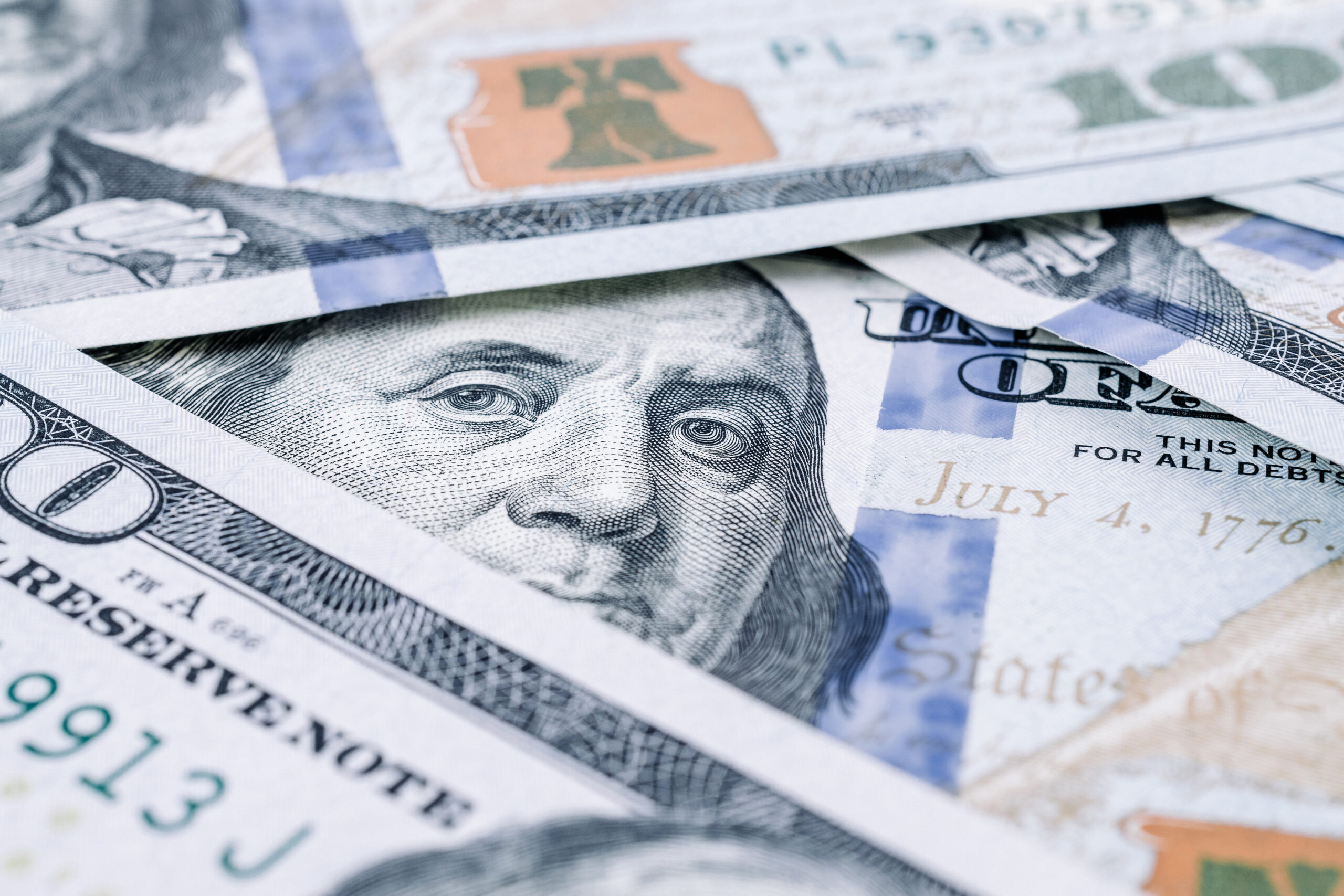
Argentina’s new bid to ‘sterilize’ peso emissions lowers parallel dollar rates… now what? - Buenos Aires Herald
While Milei says this is the first step toward lifting currency controls, critics worry about the depletion of international reserve
buenosairesherald.com
I saw some article the other day in the USA from Milei that said something about the exchange rate would be 3,000 to $1 if it wasn't for his Economic Minister. So the exchange rate is heading to 3,000 to $1? That would be great for my upcoming trip. Would make things much cheaper.
Finance Prof
Well-known member
Correct @FuturoBA. Wall Street doesn't like wild sudden knee jerk decisions. They also don't like manipulation and Caputo's announcement this weekend was not well liked by Wall Street. Remember all these bankers care about is Argentina building up their reserves so they can get paid back. That's their #1 priority. They don't really care about Argentina. They care about getting $$$$.I think this is a situation where the more the government tries to do, the more trust it loses. The more trust it loses, the more volatile the exchange rate becomes. The more volatile the currency is the more people will look for stability, and in this case towards the dollar. Hence pushing the value of the dollar up and consequently the value of the peso down.
And you're right @Betsy Ross nobody really knows what's going on. It reality, it may not be any policies that's affecting the exchange rate, but the uncertainty and anxiety itself making the market act irrational or not.
You can see today the exchange rate is heading back up but not only that but Argentine stocks plummeted 5.5% on Wall Street. Dollar bonds fell and the country risk is heading up.
Avocado
Well-known member
Correct @FuturoBA. Wall Street doesn't like wild sudden knee jerk decisions. They also don't like manipulation and Caputo's announcement this weekend was not well liked by Wall Street. Remember all these bankers care about is Argentina building up their reserves so they can get paid back. That's their #1 priority. They don't really care about Argentina. They care about getting $$$$.
You can see today the exchange rate is heading back up but not only that but Argentine stocks plummeted 5.5% on Wall Street. Dollar bonds fell and the country risk is heading up.
The problem is that Milei only want to hear people that say he not make mistakes. Remember Caputo was part of the team that got Argentina into mess in first place while he was helping Macri. You have smart people telling Milei mistake to listen to Caputo but Milei fire all the people that give advice.
Many economist and smart businessman say that the blue dollar is undervalued and peso is overvalued. Advisory board not good if you only have people that will tell President he is smart and making right decision. Look at Fausto Spotorno and Teddy Karagozian.
Karagozian is wise man. He question how rice can be more expensive in Argentina than in the UK. He say even at 1,500 to $1 US it is not enough. he say that publicly and get fired. He say the recovery is not going to happen. Read this good article. Then you see why the blue dollar keep going higher.

El Gobierno echó a Teddy Karagozian, el asesor económico de Javier Milei que había cuestionado a Luis Caputo
Respondía a Demian Reidel, quien tomó la decisión, según anunció el vocero presidencial, Manuel Adorni.Días atrás había dado un paso al costado Fausto Spotorno, quien también había manifestado críticas al Gobierno.
Talk to any businessman or someone that owns a business here and most are saying the peso is overvalued. These guys had the balls to tell it to Milei or announce it in the press. You talk to any good economist and they say that Caputo and the Central bank manipulating and intervening in the markets is not sustainable. The exchange rate seems to reflect that. Can't wait to see how high it goes.
Betsy Ross
Well-known member
He is probably ok with people that disagree with him and tell him privately but some of these people were just going on X to announce things. Several friends in finance and banking here tell me that the intervention probably wouldn't work as intended at least over an extended period.Talk to any businessman or someone that owns a business here and most are saying the peso is overvalued. These guys had the balls to tell it to Milei or announce it in the press. You talk to any good economist and they say that Caputo and the Central bank manipulating and intervening in the markets is not sustainable. The exchange rate seems to reflect that. Can't wait to see how high it goes.
TonyTigre
Well-known member
Just a few things to keep in mind:
1. As I explained in the post linked below, it's important to consider what date range you are comparing to get a better perspective before making a conclusion about a trend.
 www.expatsba.com
www.expatsba.com
2. In the post linked below, I explained that the timing and frequency of the government intervention is not set in stone. If you consider this along with the previous point, it doesn't make sense to draw any conclusions at this time. I want to reiterate the point that as progress is made, the need for intervention decreases. Due to the commitment to not increasing the amount of pesos, the amount needed for the intervention is not as high. Also, the reserves could continue increase even if some dollars are sold depending on the amount used. Besides an increase in regular tax revenues, I am curious about the effect of the tax amnesty as the date of the info sharing with the US IRS approaches.
 www.expatsba.com
www.expatsba.com
3. I personally would put a lot more weight on Dólar MEP and Dólar CCL instead of Dólar Blue if I were to make any financial transactions that involve ARS exchange rates. The Argentinian government isn't selling their dollars in a cueva. People have to be constantly reminded that even Western Union tracks CCL instead of Blue, and foreign credit cards track MEP with the card companies taking a few percentage cut. So while it's too early to make any conclusions, I would keep an eye on the MEP and CCL rates more.
1. As I explained in the post linked below, it's important to consider what date range you are comparing to get a better perspective before making a conclusion about a trend.
Banking - What is going on with the Blue dollar? Why is it going down?
Wow! I haven't been on this site in a while. Pleasantly surprised to see the exchange rate has jumped up to 1,400+. It was just 1,000 a few months ago. Nice! Time to come back down.
2. In the post linked below, I explained that the timing and frequency of the government intervention is not set in stone. If you consider this along with the previous point, it doesn't make sense to draw any conclusions at this time. I want to reiterate the point that as progress is made, the need for intervention decreases. Due to the commitment to not increasing the amount of pesos, the amount needed for the intervention is not as high. Also, the reserves could continue increase even if some dollars are sold depending on the amount used. Besides an increase in regular tax revenues, I am curious about the effect of the tax amnesty as the date of the info sharing with the US IRS approaches.
Blue dollar hits a new historical record! 1,500 to $1 USD
1,500? Oh my. We were there just a few months ago and it was around 1000. We feel fortunate that when we lived in Argentina the exchange rate was fairly stable. That is far from the case now!
3. I personally would put a lot more weight on Dólar MEP and Dólar CCL instead of Dólar Blue if I were to make any financial transactions that involve ARS exchange rates. The Argentinian government isn't selling their dollars in a cueva. People have to be constantly reminded that even Western Union tracks CCL instead of Blue, and foreign credit cards track MEP with the card companies taking a few percentage cut. So while it's too early to make any conclusions, I would keep an eye on the MEP and CCL rates more.
Betsy Ross
Well-known member
Correct. As far as the IRS and AFIP, many locals don't think they will actually pull it of this year. You are right @TonyTigre that as the date approaches or once there is actual confirmation that the sharing has started, you will probably see more people taking advantage of the amnesty.Just a few things to keep in mind:
1. As I explained in the post linked below, it's important to consider what date range you are comparing to get a better perspective before making a conclusion about a trend.
Banking - What is going on with the Blue dollar? Why is it going down?
Wow! I haven't been on this site in a while. Pleasantly surprised to see the exchange rate has jumped up to 1,400+. It was just 1,000 a few months ago. Nice! Time to come back down.www.expatsba.com
2. In the post linked below, I explained that the timing and frequency of the government intervention is not set in stone. If you consider this along with the previous point, it doesn't make sense to draw any conclusions at this time. I want to reiterate the point that as progress is made, the need for intervention decreases. Due to the commitment to not increasing the amount of pesos, the amount needed for the intervention is not as high. Also, the reserves could continue increase even if some dollars are sold depending on the amount used. Besides an increase in regular tax revenues, I am curious about the effect of the tax amnesty as the date of the info sharing with the US IRS approaches.
Blue dollar hits a new historical record! 1,500 to $1 USD
1,500? Oh my. We were there just a few months ago and it was around 1000. We feel fortunate that when we lived in Argentina the exchange rate was fairly stable. That is far from the case now!www.expatsba.com
3. I personally would put a lot more weight on Dólar MEP and Dólar CCL instead of Dólar Blue if I were to make any financial transactions that involve ARS exchange rates. The Argentinian government isn't selling their dollars in a cueva. People have to be constantly reminded that even Western Union tracks CCL instead of Blue, and foreign credit cards track MEP with the card companies taking a few percentage cut. So while it's too early to make any conclusions, I would keep an eye on the MEP and CCL rates more.
Finance Prof
Well-known member
This is true. Most of these people say the same thing that the peso is still overvalued. There are a lot of challenges to intervening. This article was very good in describing the challenges of what they are doing and the situation Argentina is in.Talk to any businessman or someone that owns a business here and most are saying the peso is overvalued. These guys had the balls to tell it to Milei or announce it in the press. You talk to any good economist and they say that Caputo and the Central bank manipulating and intervening in the markets is not sustainable. The exchange rate seems to reflect that. Can't wait to see how high it goes.

Milei's Bold Zero Emission Gamble Amid Argentina's Economic Challenges
President Javier Milei's plan to eliminate monetary emissions aims to curb Argentina's inflation and stabilize the exchange rate. This ambitious move faces challenges from low central bank reserves and a slowly recovering economy.
Uncle Wong
Well-known member
The Central Bank doesn't seem like they are doing anything either way today. The rate hasn't really moved too much today. For all that talk this weekend it doesn't look like the Central Bank is doing anything.
Uncle Wong
Well-known member
Anyone's guess. Just follow the real time rate yourself. No one can predict what it will do. Probably depends on what the government does and how much they intervene each day.
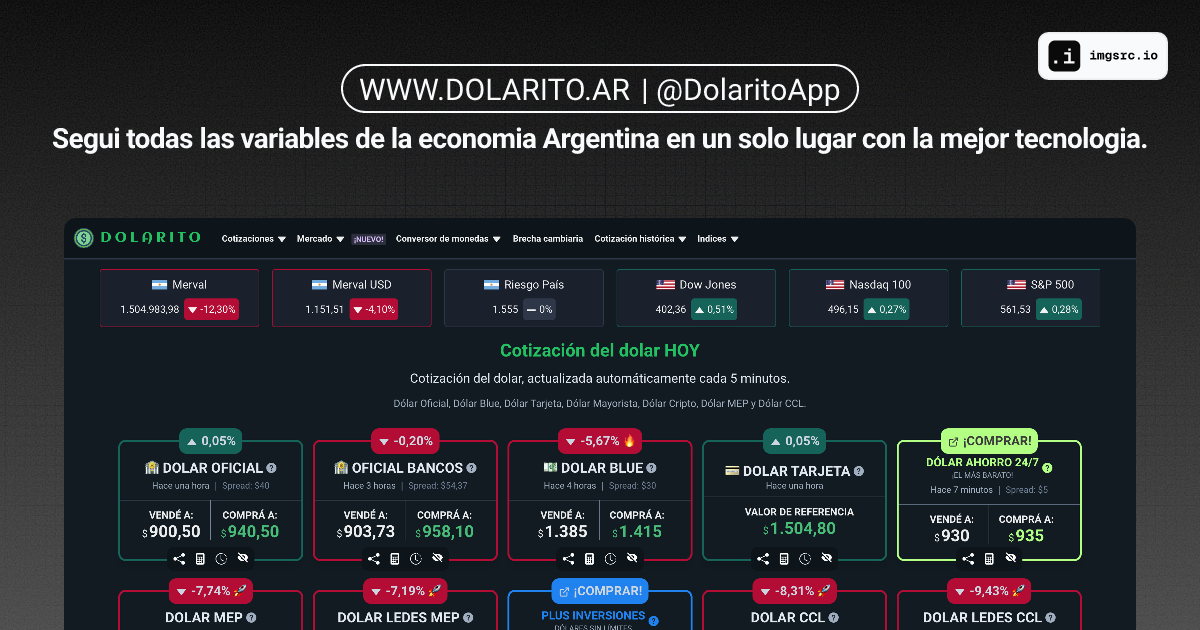
Dólar hoy, cotización del dólar, precio del dólar, dólar blue, precio histórico del dólar, valor del UVA | Dolarito.ar
Seguí la cotización del dólar minuto a minuto, compara cotizaciones, visualiza los valores históricos, conocé el precio del dólar, evolución del valor UVA
Similar threads
- Replies
- 0
- Views
- 33
- Replies
- 0
- Views
- 126
- Replies
- 0
- Views
- 109
- Replies
- 0
- Views
- 23
Community Insight...
Engage explore adapt in your expat community.
Receive personalized job market insights from seasoned expats in your area
Discover local cultural nuances and festivities shared by community members
Get your tailored expat living guide curated by experienced locals

